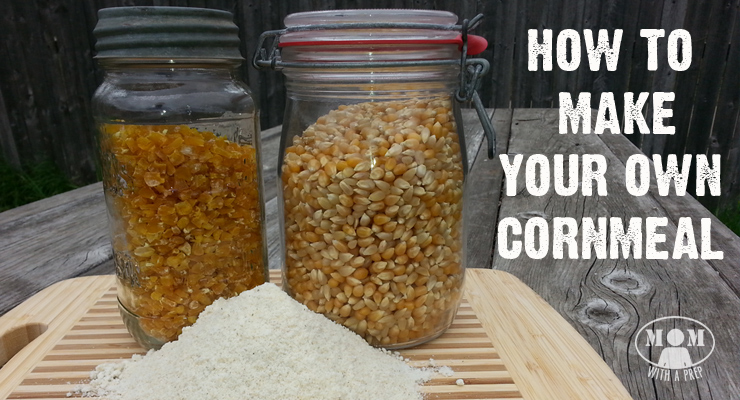
Earlier, I showed you how to dehydrate frozen corn, which is a perfect beginner’s dehydration project. The problem comes in learning what to do with that dehydrated food beyond simply throwing it into a pot of stew or rehydrating it to serve for a meal. Grinding or powdering is a great way to make those dehydrated vegetables or fruit become more than just a single dish to serve next to a piece of meat!
This also extends to our pantry. There are items that we have that feel like unitaskers. Their sole purpose is for creating a single food dish. But we don’t want unitaskers in our kitchen, we want things that are versatile and can be used for multiple things so that they don’t take up precious space! Popcorn is one of those foods. I’m not talking about the stuff in the chemically-laden bags that go in the microwave. I’m talking about that bottle of Orville’s popcorn sitting in the back of your pantry that you always meant to pull out and make your own Jiffy Pop for movie night one night. It’s got a different use, too!
So here’s the deal:
Let’s find a new way to use our dehydrated corn or popcorn and make something completely new!
Not long ago, the folks at The Wonder Mill Company invited me to join in on learning how to grind my own grains. I was super excited to be able to participate in their program as it was one of those self-reliant projects. I’ve always wanted to be able to do this. But instead of just showing you how to grind your own wheat, which you can see over at my friend Julie’s blog, HomeReadyHome.com, I’m going to show you how to make your own cornmeal!
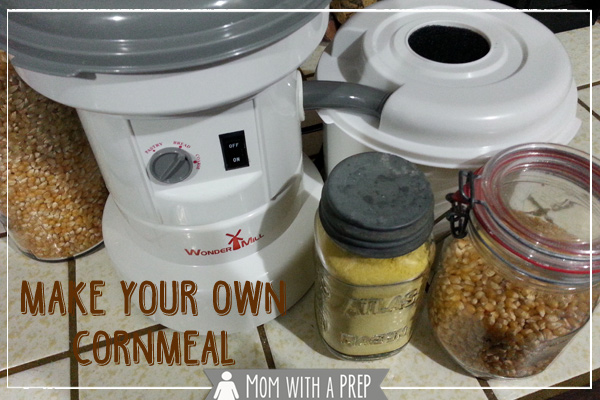
I’ve been invited to be a part of the Wondermill Challenge. What’s that you ask? It’s a challenge where Wondermill provides bloggers with a Wondermill to allow them to learn just how versatile and wonderful home-ground whole grains can be. And what makes it especially good for those of us who are looking to increase our food storage to be prepared for life’s little emergencies, a grain mill allows you to make your food storage more versatile
How is Cornmeal Made?
Cornmeal is simply corn kernels that have been dried and then ground, whether by a blender or a mill. I’m using the Wonder Mill Electronic Grain Mill today.
What types of corn are there?
While there are tons of varieties of corn out on the market, I’m going to stick to the most commonly used.
- Field or Dent – this is a heartier type of corn that has a ‘dent’ in it when it reaches maturity. It’s used generally to feed livestock, make corn syrup, and is the number one type of corn grown in America. Modern sensibilities say that it isn’t fit for human consumption and we should only eat sweet corn, but field corn can be eaten if picked early in the process and cooked in sweet water!
- Sweet Corn – this type of corn is picked early in its maturation so that it’s still in a milky stage. It’s a vegetable at this point instead of being dried and considered a grain. Its sweet flavor is great on the grill with a little pepper – one of our family’s favorite summer treats!
- Popcorn– a variety of corn that has a great mushy/starchy inside but a hard shell. When it encounters enough heat, the insides steam and then explode!
- Hominy – which is a white corn that has been soaked in an alkali solution to create nixtamal. It is course ground to make grits, or more finely ground for masa, the flour used to make tortillas.
Why not just buy cornmeal?
Most of the time, buying the ‘flour’ is so much easier than storing the grain and grinding to make your own. When buying commercially ground cornmeal at the store, much of it is degerminated, meaning the rich germ from the grain is missing, taking much of the nutrition with it, though it does increase the ability for the cornmeal to sit on the shelf for longer periods of time without going rancid. The whole grain that you grind yourself contains ALL of the nutrients from the grain and you can grind as little or as much as you need. You can purchase commercially ground cornmeal that is still a whole grain, like Palmetto Farms Cornmeal. This particular cornmeal is also non-GMO if that’s an issue for you.
There is an issue, though. Popcorn should never be your main source of ingredient for creating cornmeal. You can use it, as long as you have a well-balanced diet, as an occasional treat. But don’t make it your main storage component for an alternative flour. And if you need more information from a nutritional anthropologist, check out this transcript from Good Eats with Alton Brown. Deb Duchon shares the reason corn needs special treatment.
What kinds of corn can I use to grind cornmeal?
While field corn is generally used to make cornmeal, any type of corn that is properly dried can be ground into cornmeal. Your flavors and textures may vary a little, but they do work. I’ll be showing you how to grind both sweet corn and popcorn here. I found that dehydrated sweet corn gave a really bright yellow color while the popcorn gave a much more subdued color.
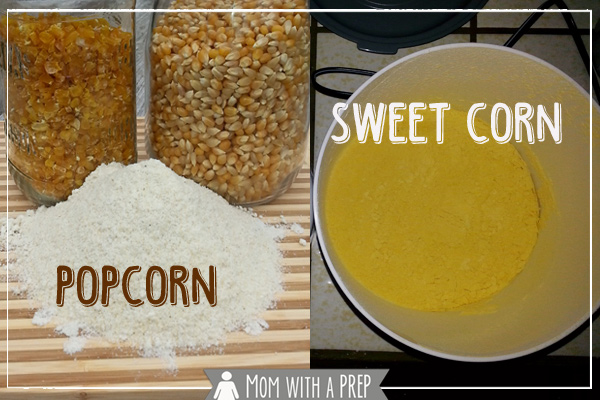
How to Make Your Own Cornmeal from Dehydrated Corn or Popcorn
1. Be sure to read the directions of your particular grain mill or blender. I’ll be giving the instructions from my WonderMill, but you can also do this in a high power blender, a manual mill, or even a mortar and pestal.
2. Turn on your grain mill after you’ve hooked the bin to the motor.
3. Pour in the amount of dehydrated corn or popcorn that you need. I found it was a 1:1 ratio of corn to cornmeal.
4. Watch it go!
This is what I had after 1 C of dehydrated sweet corn.
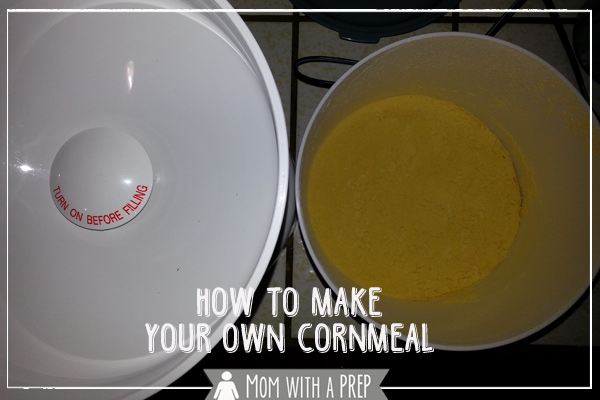
It really is that easy. I found that with my dehydrated sweet corn, it was a 1:1 ratio of corn to cornmeal. The popcorn was a little higher of a ratio, about 1:1.25, but you can easily make a little more or store any extra that you have in your freezer. I was impressed at how fine the meal was because I expected it to be much coarser. But let me warn you, please do wear ear protection. I already have a pair of earplugs that I use if I’m doing a lot of work with my blender, and I’ll be using it for the WonderMill as well.
I ended up doing the entire jar knowing we’re going to be doing a few things with cornmeal in the next few days. You can see the original fullness of the jar in the first image on this post. It’s so light and fluffy and is going to taste yummy! One cool thing we noticed, when we were grinding the sweet corn, our whole kitchen began to smell like summer – freshly boiled corn on the cob!
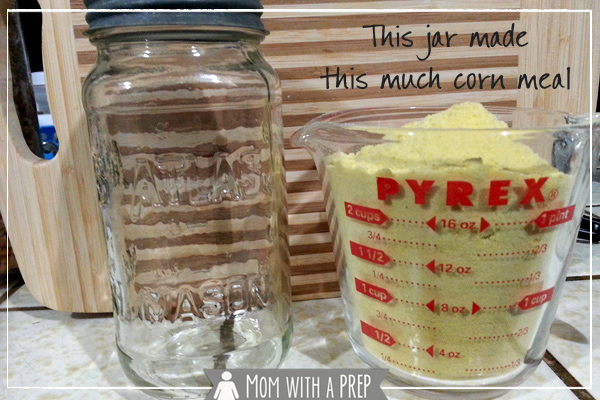
ETA: This morning, when we made Johnny Cakes from our cornmeal, I found the sweet cornmeal was really sweet and didn’t need the sugar from the recipe. The Popcorn cornmeal was more in line with what I’m used to cornmeal tasting like. But if you’re a fan of the sweeter cornbreads, the dehydrated sweet corn would work really well for you! Which side are you on for cornbread? Sweet or not? I prefer a little sweetness to mine.
The Kitchen Aid has an attachment for grinding grains, and you can do it in your pro-level blenders, but I was unhappy with how long it took my blender and how overheated it would get if I did it for too long. I had to do it in too many passes. The WonderMill is quick and easy!
We’re a family who loves pancakes. In fact, while I’m sitting here writing this post, my youngest is making us breakfast — frozen pancakes we made a week ago that I do in huge batches so he can easily throw them into the toaster to warm up. In fact, we love it so much, we’re using our freshly ground cornmeal to make Johnny Cakes! Come to the Wondermill Blog to learn more!
For a twist on a great, hearty breakfast, and to tie into a history lesson we’ve been doing, we created these cornmeal pancakes similar to a Johnny cake. And all from the popcorn, we have in our food storage! You’ve got that right. POPCORN! I bet many of you have a bag or a bottle of Orville’s in the back of your pantry just dying to be used for something. Put it to good use with a heavy-duty blender like the Vitamix or Ninja or Blentec, a hand grain mill or with the Wondermill!
>>So come join me at the Wondermill blog while I make us all a mess of cornmeal pancakes!
My next purchase will be the Wonder Mill, Jr. which is the hand-mill without electricity! If you’re interested, you can purchase a Wonder Mill or Wonder Mill, Jr. (non-electric hand mill) through their company or through Amazon.
If you’d like more ideas about how to grind your own flours at home and love having a book version in your kitchen, try out this book on Homemade Flours.
Katy Willis is a writer, lifelong homesteader, and master herbalist, master gardener, and canine nutritionist. Katy is a preparedness expert and modern homesteader practicing everyday preparedness, sustainability, and a holistic lifestyle.
She knows how important it is to be prepared for whatever life throws at you, because you just never know what's coming. And preparedness helps you give your family the best chance to thrive in any situation.
Katy is passionate about living naturally, growing food, keeping livestock, foraging, and making and using herbal remedies. Katy is an experienced herbalist and a member of the CMA (Complementary Medical Association).
Her preparedness skills go beyond just being "ready", she's ready to survive the initial disaster, and thrive afterward, too. She grows 100% organic food on roughly 15 acres and raises goats, chickens, and ducks. She also lovingly tends her orchard, where she grows many different fruit trees. And, because she likes to know exactly what she's feeding her family, she's a seasoned from-scratch cook and gluten-free baker.
Katy teaches foraging and environmental education classes, too, including self-sufficient living, modern homesteading, seed saving, and organic vegetable gardening.
Katy helps others learn forgotten skills, including basic survival skills and self-reliance.
She's been published on sites such as MSN, Angi, Home Advisor, Family Handyman, Wealth of Geeks, Readers Digest, and more.


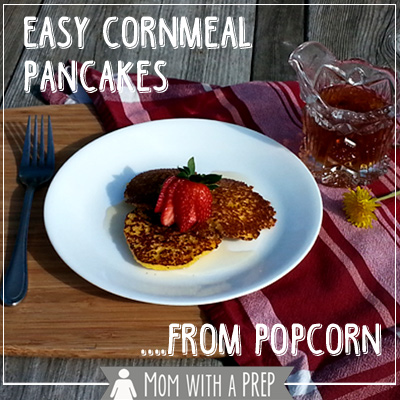
Thank you for your wonderful ideas. How do you dehydrate Sweetcorn and at what stage?
Thanks
Michael
Thank you for your wonderful ideas. How do you dehydrate Sweetcorn and at what stage?
Thanks
Michael